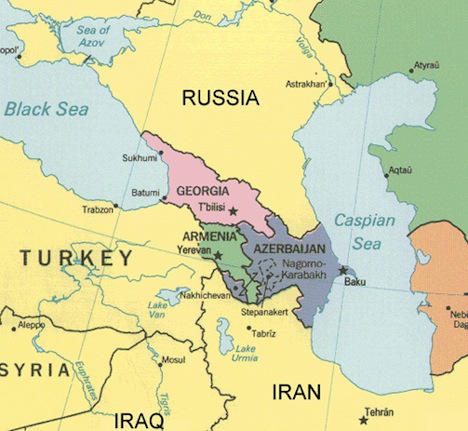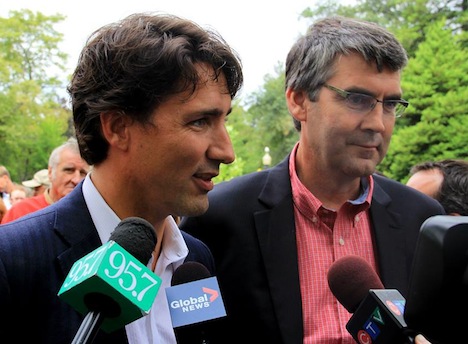For a country whose voting hijinks extend even to the Eurovision song contest, it should come as no surprise that Azerbaijan has something less than the best democratic pedigree. ![]()
Since the end of the Soviet Union, the Aliyev family has held an iron grip on Azerbaijan’s presidency — and that has not changed today, with the news that Ilham Aliyev won reelection in today’s presidential ‘election,’ less a free vote than an exercise in box-checking for a decidedly undemocratic regime.
Azerbaijani officials apparently even released election results before the voters were even counted. Classic you, Azerbaijan!
With around 84% of the vote according to initial reports, Aliyev is down from the 87.3% he won in the prior 2008 presidential race (his nearest opponent won just 2.8% five years ago). That’s despite the fact that a long-fractured Azerbaijani opposition united for the first time in today’s election behind the candidacy of historian Jamil Hasanli, who has won between just 8% and 10% of the vote today, according to initial reports.
First, a little background. What is Azerbaijan and why should you care?
It’s a former Soviet republic in the Caucasus, and it’s strategically nestled south of Russia, north of Iran and near Turkey. Oil wealth means that GDP per capita (over $7,000) is double that in neighboring Armenia and Georgia, but also that Aliyev holds a strong grip on the levers of power.
It’s fairly important because it’s a huge supplier of natural gas and oil to European markets through Georgia and Turkey, thereby bypassing Russia. It’s also the key to any future Caspian Sea gas pipeline, because that pipeline would almost certainly run from Turkmenistan through the Caspian Sea to Baku, the Azerbaijani capital, and the through Armenia, Georgia or Russia to Turkey and then to Europe. Its oil and its location mean that it hasn’t been subject to the same kind of Western scolding as some other countries.
Aliyev (pictured above) took power in 2003, succeeding his father, and he arranged for the constitution’s amendment to allow for a third term in office (and doubtless, he’ll find a way to a fourth term in 2018 as well). Heydar Aliyev ruled Azerbaijan with an iron fist well before its independence, all the way back to the 1970s in what was then Soviet Azerbaijan — Aliyev not only survived the transition from the hard-line regime of Leonid Brezhnev to the era of glasnost and perestroika under Mikhail Gorbachev, he survived the transition from Soviet republic to independent state, carrying with him all of the old traditions of corruption under the Soviet regime into the post-independence era.
Aliyev was able to do so largely because of an early 1990s war with Armenia over the disputed region of Nagorno-Karabakh. The Caucasus is a rough neighborhood, and Azerbaijan’s oil wealth hasn’t insulated it from some of the conflict that’s plagued the region. Bilateral relations with Armenia are still frayed and Nagorno-Karabakh, ostensibly part of Azerbaijan, is a de facto self-governing region dominated by ethnic Armenians. That’s unlikely to change with Aliyev’s reelection, nor was it likely to change with the also-contrested reelection of Armenian president Serzh Sargsyan (Սերժ Սարգսյան) in February 2013. But Azerbaijan, unlike Georgia and Armenia, is a Turkic country that’s 95% Muslim, and it looks as much east to central Asia and south to the Middle East as it does west to the rest of the Caucasus and north to Russia.
Though he founded the Yeni Azərbaycan Partiyası (YAP, New Azerbaijan Party) in 1992 to replace the old Soviet-aligned Azerbaijan Communist Party, Aliyev did nothing to modernize the country’s record on corruption, human rights or democracy. If anything, those problems have worsened with the oil boom that accompanied post-Soviet foreign investment in the 1990s and 2000s, so you can add to that list of trends a growing and severe income inequality.
Hasanli admitted as much, acknowledging the unlikeliness of a free and fair vote, in a piece for The Guardian on Tuesday, in which he also set forth his agenda for Azerbaijan and an indication that he would continue the fight even after the election against what he sees as an illegitimate presidency:
Since the incumbent, Ilham Aliyev, inherited power from his late father 10 years ago, Azerbaijan has become mired in rampant corruption, and the ruling regime has grown ever more authoritarian and ruthless. Most importantly, the ongoing conflict with Armenia has still not been resolved and Azerbaijani territories remain under occupation….
The oil boom of the past few years has made the Aliyev family and its cronies extremely wealthy and the regime will do its utmost to keep power. Aliyev is running for an unprecedented third term, following the disputed 2009 referendum which removed presidential term limits. I believe this contravenes the Azerbaijani constitution and the European convention on human rights. I have launched a legal challenge and demanded a judicial review. Without a clear, unbiased and unequivocal constitutional court ruling on this matter, Aliyev’s third-term presidency is not legitimate.


